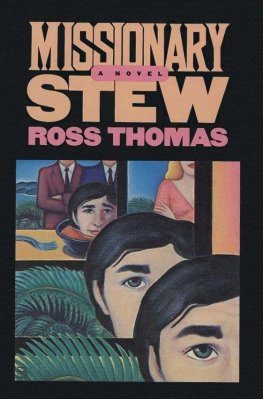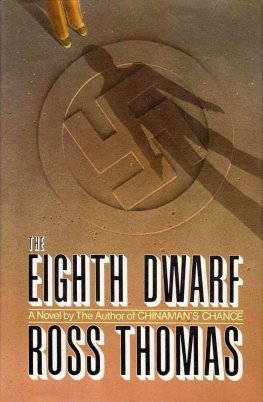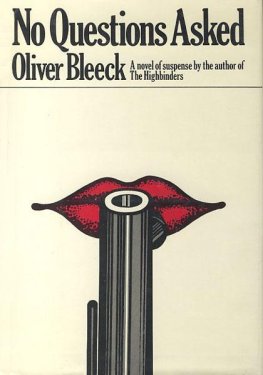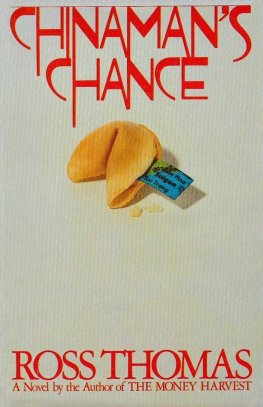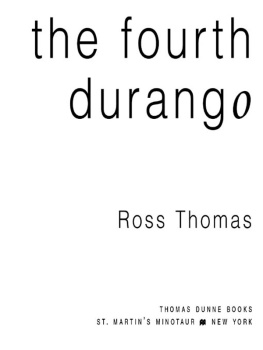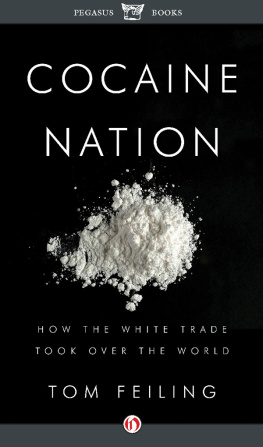Ross Thomas - Missionary Stew
Here you can read online Ross Thomas - Missionary Stew full text of the book (entire story) in english for free. Download pdf and epub, get meaning, cover and reviews about this ebook. City: New York, year: 1983, publisher: Simon & Schuster, genre: Detective and thriller. Description of the work, (preface) as well as reviews are available. Best literature library LitArk.com created for fans of good reading and offers a wide selection of genres:
Romance novel
Science fiction
Adventure
Detective
Science
History
Home and family
Prose
Art
Politics
Computer
Non-fiction
Religion
Business
Children
Humor
Choose a favorite category and find really read worthwhile books. Enjoy immersion in the world of imagination, feel the emotions of the characters or learn something new for yourself, make an fascinating discovery.
- Book:Missionary Stew
- Author:
- Publisher:Simon & Schuster
- Genre:
- Year:1983
- City:New York
- ISBN:978-0-671-49363-9
- Rating:3 / 5
- Favourites:Add to favourites
- Your mark:
- 60
- 1
- 2
- 3
- 4
- 5
Missionary Stew: summary, description and annotation
We offer to read an annotation, description, summary or preface (depends on what the author of the book "Missionary Stew" wrote himself). If you haven't found the necessary information about the book — write in the comments, we will try to find it.
Missionary Stew — read online for free the complete book (whole text) full work
Below is the text of the book, divided by pages. System saving the place of the last page read, allows you to conveniently read the book "Missionary Stew" online for free, without having to search again every time where you left off. Put a bookmark, and you can go to the page where you finished reading at any time.
Font size:
Interval:
Bookmark:
Ross Thomas
Missionary Stew
Chapter 1
He flew into Paris, the city of his birth, on a cold wet November afternoon. He flew in from Equatorial Africa wearing green polyester pants, a white T-shirt that posed the suspect question HAVE YOU EATEN YOUR HONEY TODAY? and a machine-knitted cardigan whose color, he had finally decided, was mauve.
The articles of clothing, possibly Oxfam castoffs, had been handed to him out of a green plastic ragbag by Miss Cecily Tettah of Amnesty International, who had apologized neither for their quality nor their fit. The mauve sweater must have belonged to a fat man once an extremely tall fat man. Morgan Citron was a little over six-one, but the sweater almost reached mid-thigh and fitted his emaciated 142-pound frame like a reversed hospital gown. Still, it was wool and it was warm and Citron no longer cared greatly about his appearance.
It was in a cheap hotel room near the Gare du Nord that Citron had been born forty-one years ago, the son of a dead-broke twenty-year-old American student from Holyoke and a twenty-nine-year-old French army lieutenant who had been killed in May during the fighting at Sedan. Citrons mother, obsessed with her poverty, had named her son Morgan after a distant cousin who was vaguely connected to the banking family. Citron was born June 14, 1940. It was the same day the Germans rolled into Paris.
Now on that wet, cold November afternoon in 1981, Citron went through customs and immigration at Charles de Gaulle Airport, found a taxi, and settled into its rear seat. When the driver said, Where to? Citron replied in French: Lets say you have a cousin who lives in the country.
Ah. My country cousin. A Breton, of course.
Hes coming to Paris.
But my cousin is poor.
unfortunately.
Yet he would like a nice cheap place to stay.
He would insist upon it.
Then I would direct him to the Seventh Arrondissement, in the Rue Vaneau, Number Forty-two Le Bon Hotel.
I accept your suggestion.
Youve made a wise choice, the driver said.
When they reached the Peripherique, Citron confided further in the driver. I have a diamond, he said.
A diamond. Well.
I wish to sell it.
It is yours to sell, of course.
Of course.
You know anything of diamonds?
Almost nothing, Citron said.
Still, you have no wish to be cheated.
None.
Then we shall try Bassou and you will tell him that I sent you. He will give me a commission. A small one. He will also give you a fair price. Low, but fair.
Good, Citron said. Lets try Bassou.
Three days before, Citron had watched in the early-morning African hours, already steaming, as Gaston Bama, the sergeant-warder, brought in and ladled out the famous meal that eventually was to help drive the Emperor-President from his ivory throne.
Bama was then an old man of fifty-three, corpulent, corrupt, and slow-moving, with three chevrons on his sleeve that testified to his rank, the same rank he had held for seventeen years. For nearly all of the past decade he had been chief warder in the section detranger of the old prison the French had built back in 1923, long before the country was an empire, or even a republic, and still then only a territory of French Equatorial Africa.
The foreigners section was in the small, walled-off east wing of the prison. That November it held not only Morgan Citron, but also four failed smugglers from Cameroon; a handful of self-proclaimed political refugees from Zaire; six Sudanese reputed to be slavers; one mysterious Czech who seldom spoke; and an American of twenty-two from Provo, Utah, who insisted he was a Mormon missionary, although nobody believed him. There were also three rich young Germans from Dusseldorf who had tried to cross Africa on their BMW motorcycles only to break down and run out of money a few miles outside the capital. Because no one had quite known what to do with them, they were clapped into prison and forgotten. The rich young Germans wrote home every week begging for money and UN intervention. Their letters were never mailed.
It was largely because he was bilingual in French and English that Morgan Citron had been elected or perhaps thrust into the position of spokesman for the foreign prisoners. His only other qualification was his gold wrist watch, a costly Rolex, that he had bought in Zurich in 1975 on the advice of a knowledgeable barkeep who felt that gold might be looking up as an investment. Just before the Emperor-Presidents secret police had come for him in his room at the InterContinental, Citron had slipped the watch from his left wrist and onto his right ankle beneath his sock.
That had been nearly thirteen months ago. Since then he had traded the gold links in the expansion band one by one to Sergeant Bama for supplementary rations of millet and cassava and fish. Infrequently, no more than once a month, there might also be some red meat. Goat, usually. Elderly goat. Citron shared everything with the other prisoners and consequently was not murdered in his bed.
There had been thirty-six links in the watchs gold expansion band originally. In thirteen months, Citron had parted with thirty-four of them. He knew that soon he would have to part with the watch itself. With his gold all gone, Citron was confident that his term as spokesman would also end. If not drummed out of office, he would abdicate. Citron was one of those for whom political office had never held any attraction.
Sergeant Bama watched as the skinny young private soldier put the immense black ironstone pot down near the bench on which Citron sat in the shade just outside his cell.
There, Sergeant Bama said. As I promised. Meat.
Citron sniffed and peered into the pot. Meat, he agreed.
As I promised.
What kind of meat?
Goat. No, not goat. Four young kids, tender and sweet. Taste, if you like.
Citron yawned hugely, both to express his indifference and to commence the bargaining. Last night, he said, I could not sleep.
I am desolate.
The screams.
What screams?
The ones that prevented me from sleeping.
I heard no screams, Sergeant Bama said and turned to the private soldier. Did you hear screams in the night? You are young and have sharp ears.
The private soldier looked away and down. I heard nothing, he said and drew a line in the red dirt with a bare toe.
Then who screamed? Citron said.
Sergeant Bama smiled. Perhaps some pederasts with unwilling partners? He shrugged. A lovers quarrel? Who can say?
They went on for half an hour, Citron said. The screams.
I heard no screams, Sergeant Bama said indifferently and then frowned. Do you want the meat? Four kilos.
And the price?
The watch.
You grow not only deaf in your old age, but senile.
The watch, Sergeant Bama said. I must have it.
Citron swallowed most of the saliva that had been created by the smell of the meat. I will give you two links the last two provided therere two kilos of rice to go with the meat.
Rice! Rice is very dear. Only the rich eat rice.
Two kilos.
Sergeant Bama scowled. It was as excellent bargain, far better than he had expected. He changed his scowl into a smile of sweet reasonableness. The watch.
No.
Sergeant Bama turned to the private soldier. Fetch the rice. Two kilos.
After the private soldier left, Sergeant Bama squatted down beside the ironstone pot. He dipped his right hand into its lukewarm contents and removed a small piece of meat. He offered the piece to Citron. For a moment, Citron hesitated, then accepted the meat and popped it into his mouth. He chewed slowly, carefully, and then swallowed.
It is not goat, Citron said.
Did I say it was goat? I said kid young and tender. Does it not dissolve in your mouth?
Font size:
Interval:
Bookmark:
Similar books «Missionary Stew»
Look at similar books to Missionary Stew. We have selected literature similar in name and meaning in the hope of providing readers with more options to find new, interesting, not yet read works.
Discussion, reviews of the book Missionary Stew and just readers' own opinions. Leave your comments, write what you think about the work, its meaning or the main characters. Specify what exactly you liked and what you didn't like, and why you think so.

